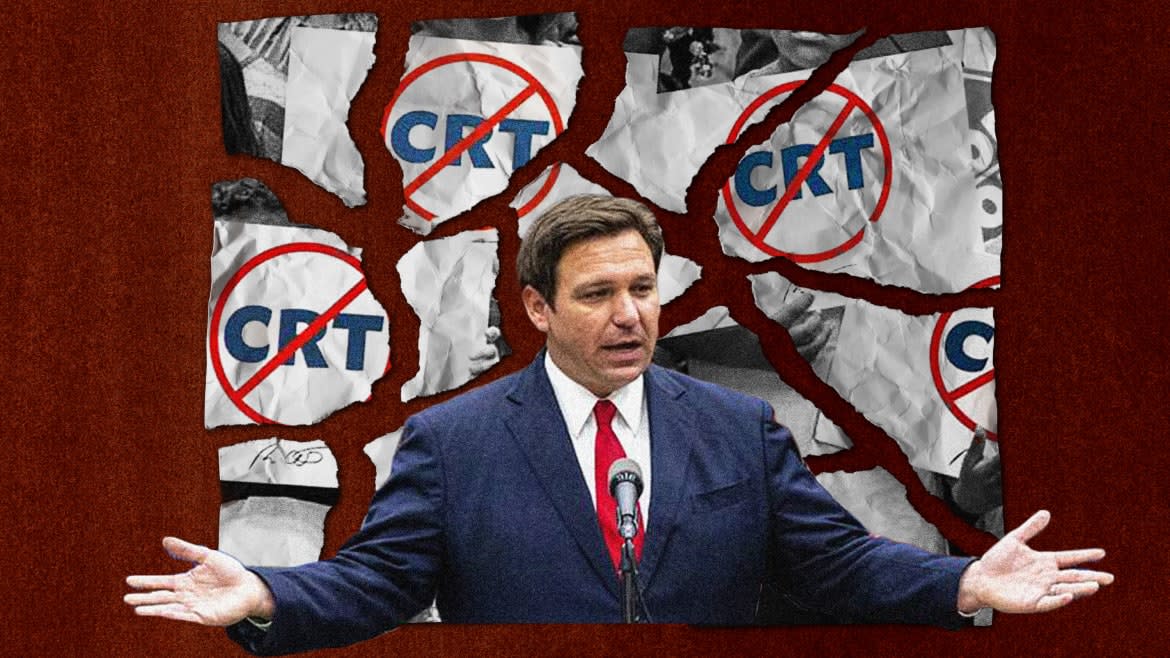Here’s Why a Court Struck Down Florida’s Dystopian ‘Stop WOKE Act’

On Thursday, a federal court blasted Florida’s “Stop W.O.K.E. Act” as “positively dystopian,” preventing enforcement of key provisions of the law in university classrooms. The law presented a blacklist of eight concepts on race and sex and declared that endorsing any of them—just once, as the court points out—should expose a professor to termination and jeopardize tens of millions of dollars in annual funding for their institutions.
The blistering opinion rightly invokes George Orwell at length, and—clocking in at 139 pages—is longer than Animal Farm. Our organization, the Foundation for Individual Rights and Expression (FIRE), challenged the law, as did others, including the ACLU and the NAACP Legal Defense Fund.
Here’s what you need to know about this anti-free speech law and why a judge put a stop to it.
1. The First Amendment protects faculty classroom speech.
We know that public universities are state actors bound by the First Amendment, and that when faculty speak as citizens on important issues, their speech is protected.
Salman Rushdie’s Stabbing Shows the Danger of Conflating Words With ‘Violence’
But what about when they’re speaking in class?
Professors are not hired to toe the party line. They’re hired to speak from their expertise, which may include views—or even views feigned to play devil’s advocate—that students, administrators, donors, and lawmakers may not like. As the Supreme Court explained, college students learn from the “robust exchange of ideas” flowing from “a multitude of tongues, [rather] than through any kind of authoritative selection.” People can’t disagree with each other if the government tells them what the truth is.
That’s exactly what Florida argued it can do. During the hearing, the court asked whether Florida could, if the Democrats took charge, “prohibit the instruction of American exceptionalism” on the theory that “it alienates people of color and minorities because it suggests… that America doesn’t have a darker side that needs to be qualified.” Florida’s answer? Yes, because “the government… is the one who decides.”
In its ruling, the court sided with the Constitution instead of Florida, explaining—as has every federal court of appeal to consider the issue—that “the First Amendment protects university professors’ in-class speech.” That’s an important right that protects faculty across the political spectrum—including conservatives, often at odds with students and colleagues to their left, and faculty without tenure, who may only have the First Amendment in their corner.
In its zeal to impose its own “pall of orthodoxy,” Florida sacrificed that last line of defense.
2. Discrimination laws are primarily about conduct, not speech.
Florida also argued that the Stop W.O.K.E. Act prevents discrimination by prohibiting the endorsement of specific concepts. In effect, this means that a professor who says they agree with one of the concepts has created a “hostile environment.”
But “hostile environment” is a term of art in discrimination law, which primarily targets conduct, not speech. Under the Stop W.O.K.E. Act, endorsing a concept in class is declared to be discrimination, even if nobody actually thinks it is offensive.
Don’t Stop Using the Term ‘Cancel Culture’
But speech—especially when it comes to matters over which people have deeply held views, like race, sex, and gender—needs breathing room. In the exchange of ideas, some ideas and speech will be deeply offensive to others, which is why discrimination law requires something more than just saying something offensive.
In fact, the Stop W.O.K.E. Act treats pure speech as discriminatory, even if nobody actually finds it offensive. For example, Florida “unequivocally” conceded that one prohibited concept is “affirmative action by any other name.” Under the law, a professor who endorses affirmative action could be disciplined and—if state regulators or lawmakers feel the punishment isn’t harsh enough—see their university’s funding slashed.
That was a change in tune for the state, which, just a year earlier, rightly adopted a law warning that faculty cannot “shield” students from “ideas and opinions that they may find uncomfortable, unwelcome, disagreeable, or offensive.”
3. The state can’t censor viewpoints in college classrooms.
Florida insisted that because the state funds universities, it can choose what classes to teach. The court didn’t disagree, indicating that faculty don’t have a First Amendment right to force a university to offer a particular course.
Ron DeSantis Isn’t a Tough Guy. He’s Just Another Cowardly Bully.
But that’s not what the law aimed to restrict. Instead, it indicates that after a university has decided to offer a course, faculty members cannot articulate prohibited views, even if they are relevant to the course. While lawmakers and administrators have long sought an end-run around the First Amendment by limiting who can speak on campus—using loyalty oaths to purge professors, speaker bans to limit guest speakers, and refusing to recognize disfavored student groups—Florida did what past censors thought too brazen. It tried to ban the ideas themselves, imposing a speech code applicable to every class.
But viewpoint discrimination is the third rail of the First Amendment. When government officials get into the business of picking winners and losers in the marketplace of ideas, courts take notice, and academic freedom “includes the freedom to engage in civil and full discussion of differing viewpoints.”
4. You can’t censor your way to free speech.
In response to a court ruling describing the law as Orwellian, Florida pledged an appeal and claimed that the Stop W.O.K.E. Act “protects the open exchange of ideas by prohibiting teachers…from forcing discriminatory concepts on students as part of classroom instruction.”
If “censorship is freedom!” sounds Orwellian, you’re not wrong.
Get the Daily Beast's biggest scoops and scandals delivered right to your inbox. Sign up now.
Stay informed and gain unlimited access to the Daily Beast's unmatched reporting. Subscribe now.

